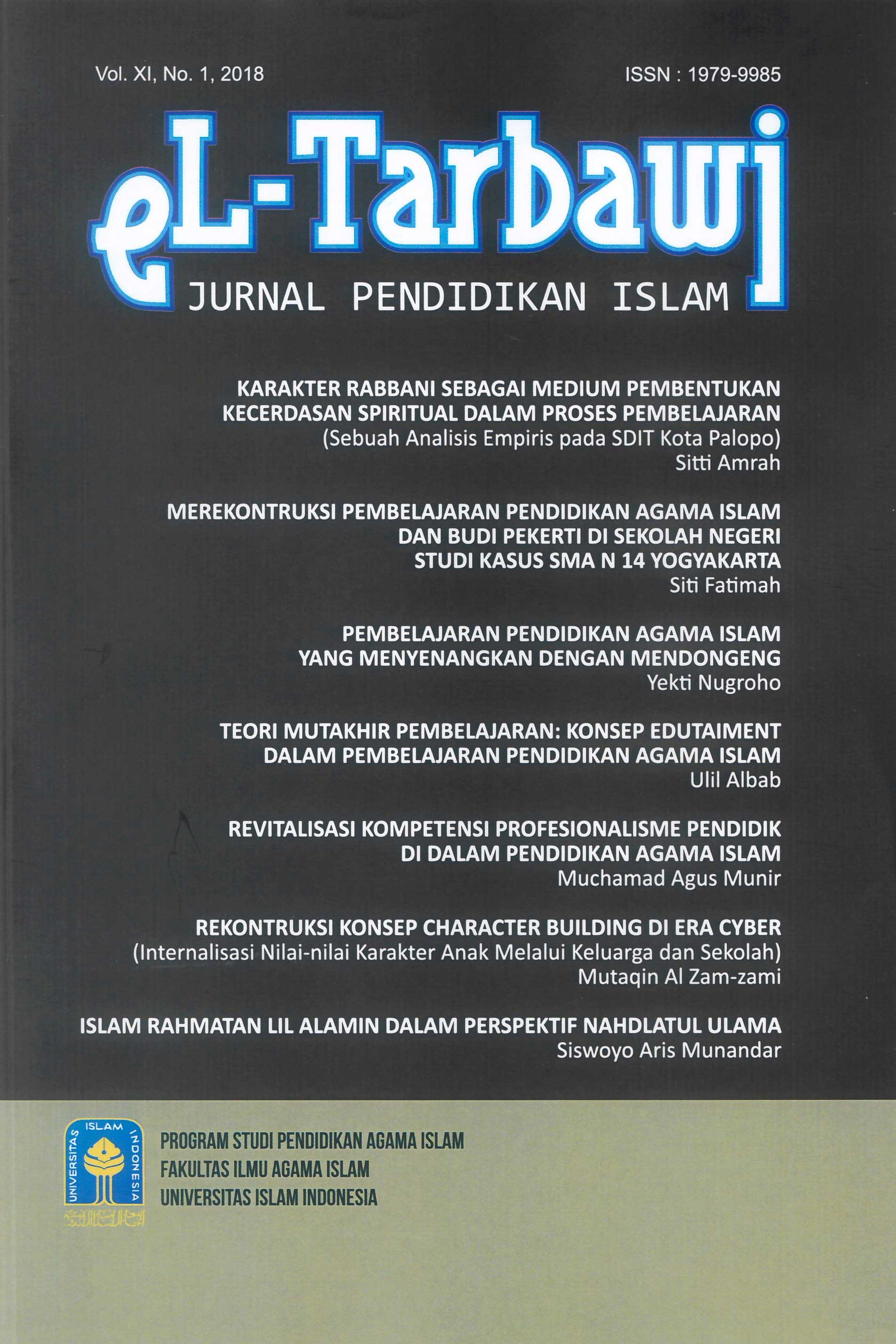Main Article Content
Abstract
Education, in its essence, is the process to direct human into significant development in discovering, nurturing and producing the highest degree of human potential. These diverse human faculties are far wider than education old paradigm intends to achieve: knowledge transformation. Thus, entertaining education tries to actualize conventional learning objectives while maintaining neglected objectives. One of the concept in entertaining education, edutainment, tries to combine two disctinct activities: education and entertainment. In the context of Islamic Education which aims a multidimensional purpose of belief, action, character and being beneficial for both religion and nation, implementing edutainment is a proper act, for it will provide freedom for student to explore knowledges from different sources, as well as nurturing other hidden human potentials. This article discusses the concept of edutainment and several mechanism to implement it comprehensively in Islamic Education.
Keywords: Learning, Edutainment, Islamic Education
Article Details
Authors retain copyright and grant the journal right of first publication with the work simultaneously licensed under a Creative Commons Attribution (CC-BY-SA) 4.0 License that allows others to share the work with an acknowledgment of the work’s authorship and initial publication in this journal.
References
- Daulay, Nurussakinah. Struktur Otak dan Keberfungsiannya pada Anak dengan Gangguan Spektrum Autis: Kajian Neuropsikologi. Buletin Psikologi, 2017, Vol. 25, No. 1.
- Hamid, M. Soleh. Tanpa tahun. Metode Edutainment. Yogyakarta: Diva Press.
- Hamruni. 2009. Edutainment dalam Pendidikan Islam &Teori-Teori Pembelajaran Quantum, (Yogyakarta: Fakultas Tarbiyah UIN Sunan Kalijaga).
- Indrawati, dan Setiawan, Wawan. 2009. Modul Pembelajaran Aktif, Kreatif, Efektif, dan Menyenangkan. Diterbitkan oleh PPPPTKIPA.
- Maftuh, Hasan. 2017. Implementasi Konsep Edutainment pada Pembelajaran Pendidikan Agama Islam di SMP Negeri 1 Boyolali. Jurnal Inspirasi.Vol 1, No. 1 Juli 2017.
- Mukaffan. 2013. Tren Edutainment dalam Metode Pembelajaran Pendidikan Agama Islam. Jurnal Tadris. Vol.8, Nomor 2. Desember 2013.
- Okan, Zuhal. 2003. “Edutainment: is learning at risk?” British Journal of Educational Technology, Vol 34 No 3 2003.
- Sanaky, Hujair A.H. 2009. Tujuh Kompetensi yang Menyenangkan dan Profesional,Yogyakarta: Power Book.
- Sanaky, Hujair A.H. 2013. Media Pembelajaran Interaktif- Inovatif. Kaukaba Dipantara. Yogyakarta.
- Suyadi. 2010. Psikologi Belajar PAUD (Pendidikan Anak Usia Dini). Yogyakarta: P.T. Pustaka Insan Madani.
- Trinova, Zulvia. 2012. Hakikat Belajar Dan Bermain Menyenangkan Bagi Peserta Didik. Jurnal Al-Ta’lim, Jilid 1, Nomor 3, hlm. 209-215.
- Syafaat, Sohari. 2008. Peranan Pendidikan Agama Islam. Jakarta: Pt. Raja
- Jamora Nasution, Abdul Gani. Pembelajaran Edutainment: Tinjauan Filosofis Pendidikan Islam.
- De Porter, Bobbi., dkk. 1999. Quantum Teaching: Mempraktikkan Quantum Learning di Ruang-Ruang Kelas, terj. Ary Nilandari. Bandung: Kaifa.
References
Daulay, Nurussakinah. Struktur Otak dan Keberfungsiannya pada Anak dengan Gangguan Spektrum Autis: Kajian Neuropsikologi. Buletin Psikologi, 2017, Vol. 25, No. 1.
Hamid, M. Soleh. Tanpa tahun. Metode Edutainment. Yogyakarta: Diva Press.
Hamruni. 2009. Edutainment dalam Pendidikan Islam &Teori-Teori Pembelajaran Quantum, (Yogyakarta: Fakultas Tarbiyah UIN Sunan Kalijaga).
Indrawati, dan Setiawan, Wawan. 2009. Modul Pembelajaran Aktif, Kreatif, Efektif, dan Menyenangkan. Diterbitkan oleh PPPPTKIPA.
Maftuh, Hasan. 2017. Implementasi Konsep Edutainment pada Pembelajaran Pendidikan Agama Islam di SMP Negeri 1 Boyolali. Jurnal Inspirasi.Vol 1, No. 1 Juli 2017.
Mukaffan. 2013. Tren Edutainment dalam Metode Pembelajaran Pendidikan Agama Islam. Jurnal Tadris. Vol.8, Nomor 2. Desember 2013.
Okan, Zuhal. 2003. “Edutainment: is learning at risk?” British Journal of Educational Technology, Vol 34 No 3 2003.
Sanaky, Hujair A.H. 2009. Tujuh Kompetensi yang Menyenangkan dan Profesional,Yogyakarta: Power Book.
Sanaky, Hujair A.H. 2013. Media Pembelajaran Interaktif- Inovatif. Kaukaba Dipantara. Yogyakarta.
Suyadi. 2010. Psikologi Belajar PAUD (Pendidikan Anak Usia Dini). Yogyakarta: P.T. Pustaka Insan Madani.
Trinova, Zulvia. 2012. Hakikat Belajar Dan Bermain Menyenangkan Bagi Peserta Didik. Jurnal Al-Ta’lim, Jilid 1, Nomor 3, hlm. 209-215.
Syafaat, Sohari. 2008. Peranan Pendidikan Agama Islam. Jakarta: Pt. Raja
Jamora Nasution, Abdul Gani. Pembelajaran Edutainment: Tinjauan Filosofis Pendidikan Islam.
De Porter, Bobbi., dkk. 1999. Quantum Teaching: Mempraktikkan Quantum Learning di Ruang-Ruang Kelas, terj. Ary Nilandari. Bandung: Kaifa.
